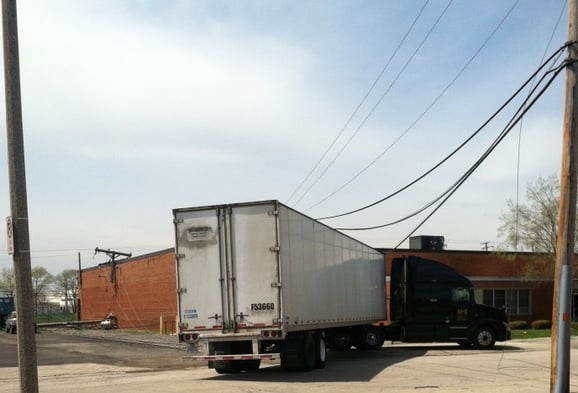A little less than two years ago, our Product Manager, Matt, wrote a blog post after a semi-truck took out some power lines around the Dickson offices and manufacturing plant. Well, it happened again. . .

Yup, somehow, someway, the same thing happened. At around 2:00PM yesterday afternoon, a semi-truck clipped one of our power lines. This time, the location of the disaster was behind our building, with the offending truck not just making a power line pole lean, but ripping it in half and sliding it along the roof of another building.
So, we lost power for the remainder of the day. We apologize for our phone system being down to anyone who may have called our offices, power didn't return until later that night, but we know our lunches were kept cold.
How? DicksonOne.
Last time this happened, Matt took it as an opportunity to explain the importance of monitoring your environment with battery backup. If you are reading this post, you probably use a Dickson product, or at the very least are somewhat interested in environmental monitoring, specifically temperature and humidity. You've probably heard the terms "data logger," and "chart recorder" before, and found the picture above to be semi-interesting (pun intended). But do your monitoring devices have the ability to alert you when they are no longer reporting?
To reiterate his message, loss of power can happen anywhere, from almost any angle. Tornado season is upon us, Hurricane season is right around the corner, earthquakes happen, and thunderstorms are all too common. Monitoring with battery backup is essential.
However, it's been two years since Matt's post, and since then, he's been busy. He is now the Product Manager of our revolutionary temperature and temperature and humidity monitoring system DicksonOne. In the two years since Matt's post, we've come along way in protecting the products that you want to keep at certain temperatures. Specifically with the use of alarms.
DicksonOne grants users the ability to set up phone call, text, and email alarms when something goes wrong. For example, you can have the DicksonOne system send you an email whenever your incubator temperature goes above 32F. Or, you can have DicksonOne call you whenever the temperature of your pharmaceutical warehouse goes below 55F.
And, DicksonOne can alert you when a logger is not reporting.
That may seem trivial, but think about it in the context of Dickson's little power line issue from yesterday. When the power to the building went out, Matt received an email from DicksonOne, saying that his logger had quit reporting. When the power went, the DicksonOne data logger went to battery-backup mode, and when it tried to send the recorded temperature values to the DicksonOne system, it couldn't. The power was out, and thus the internet was out in the DicksonOne building (Yeah, DicksonOne works with just a simple internet connection.)
So what happened? Matt received the following email, with the subject line "Temperatur

Starting to connect the dots? While it is not a perfect 1-1 ratio, and we don't recommend using DicksonOne as a way to alert you that the power in your environment is out, the logger did just that. DicksonOne gives you the ability to know when it isn't reporting to the DicksonOne system. When your router goes down, Ethernet cord is unplugged, or your power goes out (among other possible scenarios) you can know about it. How cool is that!
We've said quite a bit over the past year that DicksonOne is "your cheapest insurance policy." It's true! The alarming capabilities of DicksonOne are a great temperature monitoring tool, and a great backup to the multiple control systems you may have in place in your facility.
Traditional data loggers may have audible and visual alarms on their devices, which is good. But what if you aren't near the device? If a tree falls in a forest with no one around, does it make a sound? Maybe not, but it's still on the ground, and someone has to pick it up.
